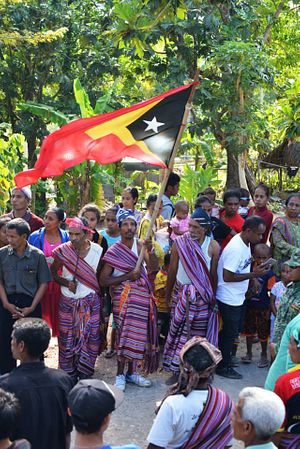The parliament of Timor-Leste voted in favor Tuesday of ratifying a maritime boundary treaty with Australia that governs how the two countries will share billions of dollars of oil and gas riches lying beneath the Timor Sea.
Timor-Leste, one of the world’s youngest and poorest nations, and Australia, one of the richest, signed a historic treaty in March last year drawing their maritime borders, ending years of acrimonious wrangling. It paves the way for development of the offshore Greater Sunrise gas field.
Timorese independence hero and the country’s chief negotiator on the treaty, Xanana Gusmao, said his country was losing $5 million a month while the agreement remained unratified.
“We dragged this thing out too long, so every month we have lost $5 million. We want to push this thing to be faster but cannot because this process is not easy,” he told parliament.
He said the treaty will be ratified by an exchange of diplomatic notes when Australia’s prime minister visits Timor-Leste on August 30, the 20th anniversary of a referendum that secured independence from Indonesia, which invaded the former Portuguese colony in 1975.
The parliament voted 42 to 23 in favor of ratification.
Under the treaty, Timor-Leste will get the biggest share of revenue from exploiting Greater Sunrise. It will be split either 80-20 if gas is piped to Australia for processing or 70-30 if it is piped to Timor-Leste.
Timor-Leste wants the gas to be processed in its territory but investors are wary because it may not be economically viable. As Bardia Rahmani reported for the June issue of The Diplomat Magazine, the government in Dili has implemented an elaborate infrastructure buildup, called the Tasi Mane project, based around the dream of establishing a gas hub on Timor-Leste’s southern coast. The plans include a processing facility for gas from Greater Sunrise. But skeptics say Tasi Mane, with a pricetag of over $10 billion, makes little economic sense. On the contrary, critics say it is contributing to corruption through kickbacks during the bidding and construction process.
Timor-Leste’s oil revenues, which finance more than 90 percent of government spending, are rapidly dwindling due to the exhaustion of existing fields in its territory. The country’s $16 billion sovereign wealth fund could be empty within 10 years because the government’s annual withdrawals are exceeding its investment returns, according to La’o Hamutuk, a Timor-Leste research institute.
By Oki Raimundos for The Associated Press with additional reporting by The Diplomat.

































